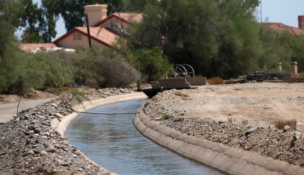Panel formed to coordinate crime lab efforts, ease backlog
Arizona Capitol Reports Staff//November 23, 2007//[read_meter]
Panel formed to coordinate crime lab efforts, ease backlog
Arizona Capitol Reports Staff//November 23, 2007//[read_meter]
A new statewide committee is designed to help the state’s eight crime labs handle forensic evidence and unify efforts to secure funding.
Arizona Attorney General Terry Goddard on Nov. 21 announced the formation of the Forensic Services Advisory Committee following the recommendation of the DNA and Forensic Technology Task Force, a body he selected in 2004 to evaluate Arizona’s state and local crime lab backlogs, funding woes and information sharing.
Citing “coordination gaps” and a sharp increase in demand for DNA evidence as technological gains allow for the reliable use of smaller and smaller bits of biological evidence, Goddard said the committee will offer guidance to get the most “bang for the buck.”
“In the past ten years we have literally seen an explosion in the area of forensic science,” said Goddard, calling the technology a “powerful tool” to help solve current and cold crimes, and to exonerate innocents accused of crimes.
Ron Reinstein, a former presiding criminal judge for the Maricopa County Superior Court and a nationally recognized expert on DNA evidence, will chair the committee to make recommendations to the state and local crime labs, which together operate on about $25 million a year.
Reinstein called for a prioritizing of the growing amount of evidence analysis sought by prosecutors, defense attorneys and law enforcement officers to alleviate the “evidence dump” faced by crime lab technicians.
And crime labs are increasingly being asked to perform forensic analysis work as juries, whose evidence expectations are being heightened by popular television crime dramas like “Crime Scene Investigation” (CSI), Reinstein told the Arizona Capitol Times.
As a result, prosecutors’ are using “negative evidence” presentations with greater frequency to demonstrate reasons why indisputable evidence from items or locations was unobtainable, he said.
However, greater public knowledge of forensic sciences is not enabling criminals to cleanly sweep scenes of evidence, he said.
“These people aren’t rocket scientists,” said Reinstein.
Currently, Arizona law requires those convicted of felonies to submit DNA samples, and beginning in January all persons arrested for serious crimes will be forced to give a DNA sample to the Department of Public Safety.
Officials at Goddard’s press conference, including Department of Public Safety crime lab supervisor Todd Griffith, minimized questions regarding the threat of privacy invasions presented by the use and storage of DNA samples.
Griffith said there are currently 150,000 results of samples in state databases, and 40,000 more that have yet to be entered. Database information, which is stored as a series of 26 numbers, would be absolutely useless if leaked.
“There is nothing you can do with it,” said Griffith, whose lab handles latent prints, toxicology, trace evidence analysis and nuclear and mitochondrial DNA analysis. “There’s no potential for abuse.”
Though biological evidence such as DNA collected on swabs is preserved in case of future advancements in forensic science, statute strictly limits its use to law enforcement purposes, Griffith said.
Veteran defense attorney Peter Hammond of the Arizona Justice Project said he supports the creation of the Forensic Services Advisory Committee, which has no statutory authority over crime labs, but he remains critical of the outcome for a few reasons.
Like its predecessor, the DNA and Forensic Technology Task Force, the committee does not yet have a member representing criminal defense attorneys. And the body is solely accountable to Attorney General’s Office, making it less likely to come to its own conclusions or able to pursue its own leads, he said.
But Goddard’s move to launch the agency is better than nothing, he said, given the Legislature’s refusal to fund and authorize “minimal justice reform” efforts such as compensating those wrongfully imprisoned.
“He’s done the right thing from an institutional standpoint,” said Hammond. “This will ultimately be good, but it could be better.”
Hammond, like public defense attorney Bob McWhirter, said ideally, crime labs in the state would be publicly funded agencies that operate independently from prosecutors and law enforcement officials.
“They would have more credibility,” said McWhirter, of the Legal Defender’s Office. “It would help the police avoid problems and you’d have somebody independent making the determination; not just what the police officer wants to hear.”
















